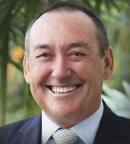On October 16 and 17, 2023, the Union for International Cancer Control (UICC) welcomed more than 350 attendees from over 75 countries to its World Cancer Leaders’ Summit in Long Beach, California, to discuss some of the most challenging issues facing patients with cancer worldwide. The theme of this year’s meeting, “Cancer Control in a Changing World,” incorporated the relationship of key factors involved in the development of cancer, threats to accessing cancer care in crisis situations and in countries without universal health coverage, and the growing threat of antimicrobial resistance on cancer treatment and survival. Presentations during the summit also explored how disruptive technologies, including mRNA vaccines, immunotherapy, artificial intelligence (AI), and personalized medicine, may help to reduce cancer inequities.
Co-hosted by ASCO, the American Association for Cancer Research, the American Cancer Society, the American Society for Clinical Pathology, The University of Texas MD Anderson Cancer Center, and Stand Up To Cancer, the summit also spotlighted the launch of the Latin America and the Caribbean Code Against Cancer. A joint publication of the International Agency for Research on Cancer (IARC) and the Pan American Health Organization, the code consists of 17 evidence-based recommendations to help prevent cancer that are adapted to common scenarios in Latin America and the Caribbean.
“The Latin America and the Caribbean Code Against Cancer, on the risk factors for developing cancer, is written in simple language and can be easily communicated to the general population,” said Cary Adams, BSc (Hon), PhD (Hon), Chief Executive Officer of the UICC. “It is important that each region has clearly stated communication about specific cancer risk and prevention strategies, because the risk factors for every region are different.”

Cary Adams, BSc (Hon), PhD (Hon)

Jeff Dunn, PhD, AO
During the UICC World Cancer Leaders’ Summit, The ASCO Post talked with Dr. Adams and Prof. Jeff Dunn, PhD, AO (Order of Australia), President of the UICC, Chief of Mission and Head of Research at the Prostate Cancer Foundation of Australia, and Professor of Social and Behavioral Science and Chair of Cancer Survivorship at the University of Southern Queensland in Australia. Prof. Dunn discussed the difficulty of accessing cancer care in countries with ongoing conflicts, the danger that antimicrobial resistance poses to patients with cancer, and how new technologies are bringing cancer diagnostics and treatment recommendations to low- and middle-income countries.
Accessing Cancer Care During Global Crises
Please talk about the importance of the World Cancer Leaders’ Summit at this juncture, when there are so many global crises impacting the ability to access cancer care, including war, poverty, and health-care inequities.
Dr. Adams: The theme of this year’s summit, “Cancer Control in a Changing World,” was deliberately chosen to capture those big global challenges you mention, as well as challenges usually not readily associated with cancer care or prevention. For example, the agenda included a session on antimicrobial resistance. There is evidence available now that suggests in 20 to 30 years, if the issue of antimicrobial resistance is not addressed by the cancer community, the chances of patients with cancer surviving an acquired hospital infection will be reduced.
Climate change is another big challenge featured at the summit, because the links among climate change, the development of cancer, and patients’ ability to access care are clear. We know, for example, that devastating hurricanes, wildfires, flooding, and droughts are becoming more frequent, which impacts health-care systems, compromises medicine supply chains, and stresses medical facilities. We also know these climate-related disasters will cause increased incidence of a variety of cancers, including lung and skin cancers.
Another subject we are covering is the growing burden of obesity country-to-country, which is putting more individuals at risk of developing an obesity-related cancer in their lifetime. Progress in halting the rise of obesity globally has not been impressive. They are all long-term, slowly emerging problems that do not necessarily have the immediate attention of the cancer community as they should.
Prof. Dunn: This meeting is about folding medical advances into global policies and systems to address the significant challenges that will compromise effective cancer control activities in the future if they are not addressed and changed.
Antimicrobial Resistance in Cancer Care
During the 2022 World Cancer Congress, UICC published its new report on antimicrobial resistance and its impact on cancer care.1 How is antimicrobial resistance becoming a growing public health issue globally?
Dr. Adams: As many as 20% of patients with cancer undergoing treatment are hospitalized due to infection or infectious disease, such as pneumonia. In addition, 10% of people living with cancer die of severe sepsis, not cancer.1
We take our lead from the experts in antimicrobial resistance. We are working with the Global Antibiotic Research & Development Partnership in Geneva to learn how we should be using antibiotics in a far more effective way, to avoid overprescription and prevent the growing resistance of bacteria to the antibiotics and other antimicrobial medicines designed to kill them. Effective antibiotics are essential to help people with cancer complete their treatment successfully and survive the disease, but we have to better manage the use of these drugs and support the research and development of new medicines.
Prof. Dunn: I know from personal experience how dangerous antimicrobial resistance is for people living with cancer. In 2022, I was diagnosed with mantle cell lymphoma, and I’m now in remission. However, the treatment left me severely immunosuppressed, and I recently contracted a resistant strain of a microbe we have not yet been able to get under control. I am sure we will, but I am an example of the danger antimicrobial resistance poses to cancer survivors.
This is not just a problem for cancer survivors in the Third World. I am Australian and fortunate to live in a high-income country with excellent health care. Antimicrobial resistance is a threat to everyone, everywhere.
In 2021, the World Health Organization (WHO) published a call to action on antimicrobial resistance.2 It recommended enhanced national and global efforts to tackle antimicrobial resistance through a unified approach to accelerating previous commitments to combat the problem, improving antimicrobial stewardship, and increasing research on the impact of antimicrobial resistance, among other steps—not just for cancer but for many illnesses.
Reducing the Rates of Obesity
A new study from the World Obesity Atlas predicts that more than half of the global population—over 4 billion people—will have obesity by 2035.3 What are some evidence-based policies and interventions that UICC and other international agencies recommend to reduce the increasing rates of obesity?
Dr. Adams: We take our guidance from the WHO on the risk factors of cancer—as well as other diseases such as cardiovascular disease and diabetes—and the best practices of reducing those risk factors such as physical activity, weight reduction, and not smoking. That said, the problem of increasing rates of obesity globally is alarming. No country has made progress on reducing the rates of obesity. The WHO has recognized obesity as a chronic disease—not a personal failing—that requires prevention approaches and management strategies at both the individual and societal levels. But implementation has been slow or nonexistent, so not much progress has been made.
Growing Cancer Burden in Latin America and the Caribbean
The Latin America and the Caribbean Code Against Cancer, a joint publication by IARC and the Pan American Health Organization,4 was launched during the summit. Please talk about the significance of this publication and how it could help reduce the cancer burden in these areas.
Dr. Adams: The first such initiative was the European Code Against Cancer, which presented 12 key actions people could take to reduce their risk of cancer that are simple to follow. My understanding is that the European Code has been very helpful, because it is written in simple language that is easily communicated to the general population. We are hopeful the Latin America and the Caribbean Code Against Cancer, which contains 17 action steps, will have a similar impact on people, so they understand the link between certain risk factors and the development of cancer, which are different in each region.
Prof. Dunn: This code provides a community-based advocacy opportunity for people in Latin America and the Caribbean to address their rising rates of cancer based on internationally agreed upon and accepted strategies, while recognizing that socioeconomic factors may make it difficult to implement the necessary changes.
I am very optimistic that some of the technologies we are seeing will allow us to leapfrog many of the challenges we currently face in accessing cancer care, especially in low- and middle-income countries.— Cary Adams, BSc (Hon), PhD (Hon)
Tweet this quote
Using Technology to Close the Equity Gap in Oncology Care
Among the topics at this year’s summit was a discussion of how technology can help disrupt inequities in cancer care. Please talk about how these advances could promote health equity.
Dr. Adams: I am very optimistic that some of the technologies we are seeing will allow us to leapfrog many of the challenges we currently face in accessing cancer care, especially in low- and middle-income countries. This includes cancer screening implementation and pathology diagnostics, for example, because now we can use remote technology to support resource-limited health systems.
One example is how the cancer hospital in Geneva (Hôpitaux Universitaires de Genéve) has partnered with Mongolian facilities to use its AI system for remote readings of imaging scans, to help clinicians in Mongolia diagnose cancer and determine the best treatment available for individual patients. Supporting data have shown that the AI system used is as accurate at diagnosing as oncologists on the scene in Mongolia. I could not imagine 5 or 10 years ago that it would be possible to provide diagnostics and treatment recommendations to remote countries like Mongolia via a French-speaking Swiss hospital.
However, having access to accurate diagnostics without the ability to receive effective treatment will not solve the problem of lack of access to good cancer care. We have to ensure that these countries also invest in core health-system infrastructure that provides all cancer treatment modalities, including chemotherapy, immunotherapy, surgery, and radiation therapy.
Prof. Dunn: The future is wide open for improvements in cancer care in low-resource countries. We just have to ensure that the use of this technology does not broaden the gap in inequitable cancer care.
DISCLOSURE: Dr. Adams and Prof. Dunn reported no financial conflicts of interest.
REFERENCES
1. Union for International Cancer Control: AMR Control Supplement. Available at www.uicc.org/resources/amr-control-supplement. Accessed November 29, 2023.
2. World Health Organization: Call to Action on Antimicrobial Resistance 2021. Available at www.who.int/news. Accessed November 29, 2023.
3. World Obesity: World Obesity Atlas 2023. Available at www.worldobesity.org. Accessed November 29, 2023.
4. Pan American Health Organization and the World Health Organization: Recommendations for policymakers on implementing the Latin America and the Caribbean Code Against Cancer. Available at www.paho.org. Accessed November 29, 2023.

